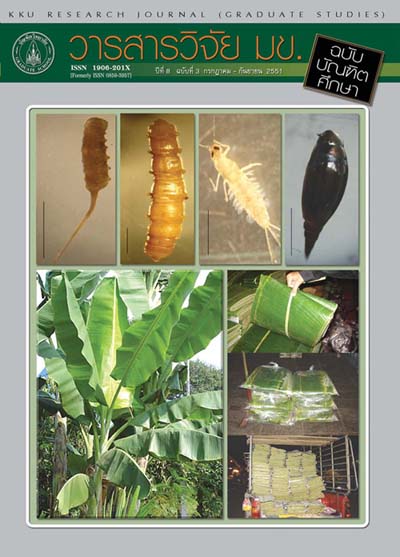The Program Development for Assisting Adolescences in Avoiding Narcotics through Self-Efficacy and Self-Control(การพัฒนาการรับรู้ความสามารถของตนเองและการควบคุมตนเองเพื่อหลีกเลี่ยงการใช้ สารเสพติดของเยาวชน)
Keywords:
Self-Efficacy(การรับรู้ความสามารถของตนเอง), Self-Control(การควบคุมตนเอง), Assisting Adolescences to Avoid Narcotics(พฤติกรรมหลีกเลี่ยงการใช้สารเสพติด)Abstract
การวิจัยครั้งนี้มีวัตถุประสงค์เพื่อพัฒนาการรับรู้ความสามารถของตนเองและการควบคุมตนเองเพื่อหลีกเลี่ยงการใช้สารเสพติดของเยาวชนและเพื่อศึกษาประสิทธิผลของหลักสูตร การวิจัยแบ่งเป็น 3 ระยะ คือ ระยะที่ 1 ศึกษาข้อมูลพื้นฐานเกี่ยวกับเยาวชนที่ใช้สารเสพติด หลักการ แนวคิดทฤษฎีเกี่ยวกับการพัฒนาการรับรู้ความสามารถของตนเองและการพัฒนาหลักสูตร ทฤษฎี ระยะที่ 2 สร้างหลักสูตรและทดลองใช้หลักสูตร ระยะที่ 3 นำหลักสูตรไปใช้และประเมินผลหลักสูตร ใช้รูปแบบการวิจัยแบบกึ่งทดลอง กับเยาวชนกลุ่มเสี่ยงจำนวน 62 คน แบ่งเป็นกลุ่มทดลอง 31 คน กลุ่มควบคุม 31 คน การวิเคราะห์ข้อมูลโดยสถิติเชิงพรรณนา ได้แก่ ร้อยละ ค่าเฉลี่ย ส่วนเบี่ยงเบนมาตรฐาน และการทดสอบค่าที (t-test) คุณภาพเครื่องมือตรวจสอบความตรงและตรวจสอบความเที่ยงของแบบวัด ส่วนข้อมูลเชิงคุณภาพใช้การวิเคราะห์เนื้อหา ผลการวิจัยพบว่า 1) เยาวชนกลุ่มทดลองมีคะแนนเฉลี่ยการรับรู้ความสามารถของตนเองและการควบคุมตนเองเพื่อหลีกเลี่ยงการใช้สารเสพติดหลังการฝึกอบรมสูงกว่าก่อนฝึกอบรมอย่างมีนัยสำคัญทางสถิติ ที่ระดับ .01 2) เยาวชนกลุ่มทดลองมีคะแนนเฉลี่ยการรับรู้ความสามารถของตนเองและการควบคุมตนเองเพื่อหลีกเลี่ยงการใช้สารเสพติดสูงกว่าเยาวชนกลุ่มควบคุมอย่างมีนัยสำคัญทางสถิติที่ระดับ .01 3) เยาวชนกลุ่มทดลอง มีคะแนนเฉลี่ยพฤติกรรมหลีกเลี่ยงการใช้สารเสพติด หลังการฝึกอบรมสูงกว่าก่อนฝึกอบรมอย่างมีนัยสำคัญทางสถิติที่ระดับ .01 4) เยาวชนกลุ่มทดลอง มีคะแนนเฉลี่ยความรู้เกี่ยวกับสารเสพติด หลังการฝึกอบรมสูงกว่าก่อนฝึกอบรมอย่างมีนัยสำคัญทางสถิติที่ระดับ .01 5) เยาวชนกลุ่มทดลอง มีคะแนนเฉลี่ยเจตคติทางลบต่อการใช้สารเสพติด หลังการฝึกอบรมสูงกว่าก่อนฝึกอบรมอย่างมีนัยสำคัญทางสถิติที่ระดับ .01The purpose of the research was to develop the program for assisting adolescences in avoiding narcotics through self-Efficacy and self-control and to study the effectiveness of this program. The research was carried out in 3 phases.In phase I,it was the development of a conceptual framework of the program. based on a needs assessment about adolescentûs use of drugs and principles, approaches and theories related. In phase II, the Program was developed and tried out on 14 adolescences identified as having a high risk drug use. In phase III, Implementing and evaluating the program was to examine its effectiveness through using a quasi- experimental design. The sample comprised 62 adolescences and all of them were divided into the experimental group(31 adolescences) and the control group (31 adolescences). The experimental group was trained by the researcher with for assisting adolescences in avoiding narcotics through self-efficacy and self-control. There were pre-test and post-test in this experiment and the period of training was 18 hours over 3 days. The data from these tests were analyzed by using descriptive statistics including percentages, means and standard deviations. The hypothesis were analyzed by using t-test and Reliability was tested using Cronbrachûs alpha co-efficient on variables. The qualitative data were analyzed by content analysis. The key results of the study was founded that 1) The Score on self-efficacy and self-control of the experimental group after the training was significantly higher than the score before the training at the .01 level .2) The score on self-efficacy and self-control of the experimental group after the training was significantly higher than the score of the control group at the .01 level . 3) The scores on behavior avoiding narcotics use were significantly higher than the scores of control group at the .01 level. 4) The scores on knowledge narcotics use were significantly higher than the scores of control group at the .01 level. 5) The scores on negative attitude towards narcotics use were significantly higher than the scores of control group at the .01 level.



